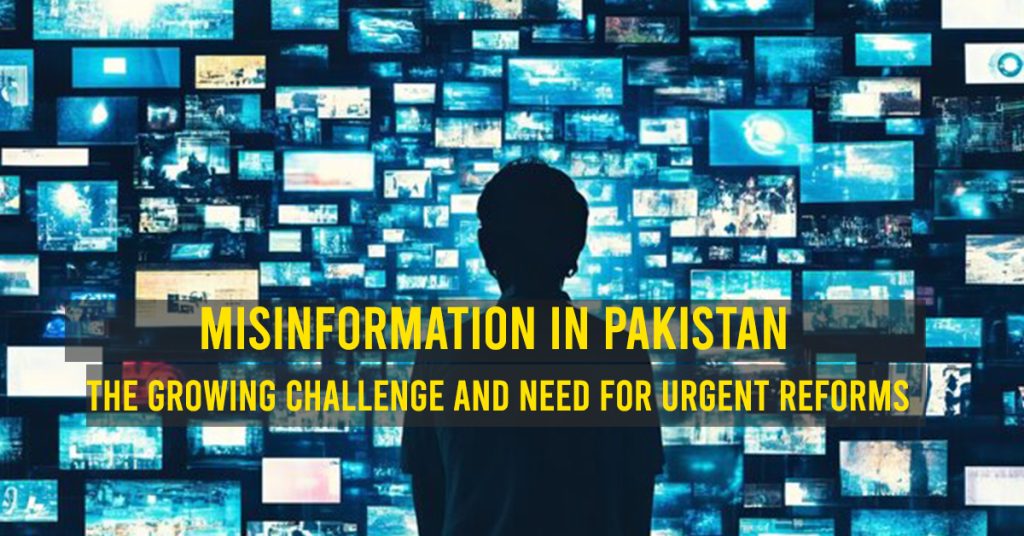Tackling Misinformation in Pakistan and its Impact on Society and Democracy
Misinformation, or the spread of false information, has become one of the most pressing challenges facing the world today. According to the 2024 Global Risks Report by the World Economic Forum, experts across the globe have identified misinformation as a growing threat that could disrupt political, social, and economic stability in the coming years. Among the countries grappling with the harmful effects of misinformation, Pakistan is highlighted as one of the most significantly impacted nations, facing dire consequences for its social cohesion, political stability, and democratic institutions.
The Rising Threat of Misinformation in Pakistan
Misinformation in Pakistan is not just a passing issue—it is a profound challenge that is eroding the foundation of society. The World Economic Forum’s report places Pakistan in the top five nations likely to be significantly impacted by misinformation in the next two years, ranking it between the fourth and sixth positions in terms of severity. This is not surprising, given that the spread of false narratives has already fueled religious conflicts, social divisions, and political instability across the country.
The problem isn’t confined to rumors or fake news; it encompasses a deliberate attempt to distort the truth, whether through social media platforms, political campaigns, or even in the everyday discourse among citizens. The consequences are far-reaching, with the rise of sectarian violence, increased political polarization, and a gradual erosion of trust in democratic institutions.
Pakistan’s Struggle with Political and Social Unrest
Misinformation has escalated tensions between various ethnic and religious groups in Pakistan. It has been used as a tool to spread hate, deepen divides, and further complicate Pakistan’s already complex political landscape. The impact is seen in the rising incidents of sectarian violence and the growing social fragmentation, which weakens national unity. Furthermore, misinformation has disrupted Pakistan’s political processes, undermining public trust in the media and elections.
This problem is particularly critical when we look at the role of misinformation in elections. It has the potential to influence voter behavior, manipulate outcomes, and create an atmosphere of distrust that can lead to violence and chaos. In the absence of factual information, the electorate becomes vulnerable to propaganda, making it difficult to maintain the integrity of democratic processes.
The Global Context and Pakistan’s Position
Pakistan is not alone in facing the dangers of misinformation. Countries such as India, the United States, and the United Kingdom are also grappling with similar challenges. In fact, India ranks first globally in terms of the threat posed by misinformation. However, Pakistan’s situation is particularly alarming given the volatile political and social environment in which these falsehoods are spreading. According to the World Economic Forum, the rapid growth of misinformation could lead to a severe weakening of democratic institutions, and Pakistan must urgently address this growing concern.
The Need for Urgent Action
The issue of misinformation is not something that can be tackled with slow or reactive measures. While the government has begun introducing legislation to combat the spread of false narratives, experts argue that the pace of these efforts is far too slow to keep up with the speed at which misinformation is disseminated. This mismatch between the rate of misinformation spread and regulatory measures is creating a dangerous gap.
In addition to legislation, experts emphasize the need for social awareness campaigns, educational reforms, and greater transparency in digital platforms to curb the tide of falsehoods. The government must prioritize digital literacy and awareness programs to help citizens differentiate between fact and fiction. Moreover, international collaboration with tech giants and social media platforms is crucial to ensure the swift removal of false content.
Conclusion
If Pakistan is to protect its democracy, political stability, and social harmony, urgent reforms are needed to counter misinformation. The government must act quickly, not only through stricter laws but also by fostering a culture of critical thinking, transparency, and media responsibility. Without these interventions, the growing tide of misinformation could destabilize the nation, leading to greater social unrest and a weakening of Pakistan’s democratic institutions.
As citizens, it is also our responsibility to engage critically with the information we encounter and to be vigilant about the narratives we choose to support. Only through collective efforts can we safeguard Pakistan from the destructive power of misinformation and ensure a stable, democratic future.


